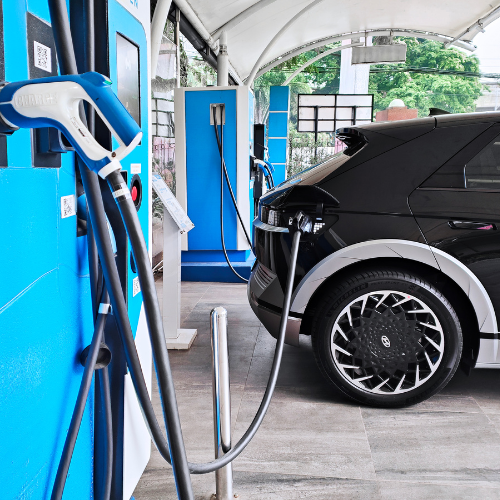With increased popularity and demand for electric cars, they are now considered a sustainable alternative to traditional petrol and diesel vehicles. According to a report from SMMT, 15.2% of new cars registered in March 2024 were pure electrics.
Potential buyers still ask whether electric cars are affordable in the long run and are still determining the actual running cost.
This guide is meticulously crafted, drawing on extensive data search and analysis from our team of experts. Our deep analysis provides you with a comprehensive understanding of the financial implications of owning an EV.
Our experts have considered factors such as battery life, charging time, range per charge and depreciation. We've also examined government incentives and their impact on the real cost, as well as comparing maintenance costs with petrol and hybrid counterparts. This practical information will help you make an informed decision.
Table of Contents
How Much Does an Electric Car Battery Cost?
Electric car batteries are a critical component of an electric car. Driving range - the main concern for potential EV buyers - is mainly determined by battery and density. The average cost of a lithium-ion battery is £109.23 per kWh in the UK. So, a 100 kWh battery equates to £10,090 to replace. The electric battery is very robust and designed to last longer - between 10 and 20 years.
Cost of Charging an Electric Car
Cost of
charging
an electric car at home
Charging your electric vehicle at home is the most affordable way to get more for your money. This method becomes more affordable when combined with specific energy tariffs or renewable energy sources like solar panels. Our experts have carried out the testing and came up with the following figures: In winter, it usually costs around £0.03/mile, and in summer, it costs around £ 0.05, which indicates relatively low costs.
In terms of cost per mile, electric cars cost around 8 pence per mile to power on a regular electricity tariff. To learn more about the EV tariff, check out this comprehensive money-saving expert guide on all the electricity tariffs available for electric vehicles in the UK. The cost can be reduced to around 2 pence per mile if you're on an EV tariff. These figures are still significantly lower than the cost per mile for petrol cars, as the current fuel prices are too high.

The other way to reduce the cost of an electric battery is to use off-peak charging. Some tariffs offer cheap electricity overnight if you connect to a green energy supply like solar panels. Government grants and employer contributions can also reduce the cost and we'll discuss this later in detail. Don't forget to check it.
Installing a wall box or a home charger also impacts the overall cost of charging at home. It influences the price in the following ways: It has an initial installation cost due to being convenient and fast charging speed; it reduces the potential time costs associated with regular plus; we don't recommend charging through the regular plug as it is slow and places a heavy load on the electricity circuits.
The additional factors that can reduces the cost further is installing a wall box. The wall box improve charging efficiency, it optimises energy usage and also it is available for incentives or rebates.
Our experts recommend a wall box to charge an electric vehicle at home. Though wall box is an additional expense at first but in the long run it definitely leads to savings.
It's worth noting the maintenance and warranty costs of the wall boxes. Though they require minimal maintenance, any necessary repairs or replacements outside the warranty period can be added to the cart.
Cost of charging an electric car at charging stations
Though charging an electric car at home is the most affordable way, it is not always the most practical, especially when travelling long distances. Charging an electric vehicle at charging stations is the most common, and it is crucial to consider its cost factor when determining the overall running cost of the electric car.
The cost of charging an electric vehicle at a public station can vary significantly depending on several factors, including the location of the charging station, the charging network, the type of charger, and the vehicle battery itself.

According to Zapmap data the average price to charge an electric car on the public charging network in February 2024 was 56p/kWh for slow/fast chargers and 81p/kWh for rapid/ultra-rapid chargers.
To give a more comprehensive picture, we evaluated the cost of one of the most popular EVs in the UK: Mg MG4 Electric. Focusing on a specific model can give us a more precise idea of the cost involved.
It is important to note that this is the average cost and time, and the actual figures can differ depending on various factors other than just charger output. Some common characteristics include your vehicle compatibility: Some electric vehicles are designed to handle higher charging rates than others. Ensure that a charger is used that is compatible with the vehicle's capacity, ensuring efficient charging. Other factors include the battery state of charge, battery management system, and battery temperature, which also affects charging efficiency.
Government Incentives and Their Impact on the Cost of Running an Electric Car
Government incentives impact significantly on overall cost of the electric car. In the UK government introduces these incentives and grants to increase electric cars adoption and development.
Check our guide to know more in detail about all the grants and incentives available for EV users in the UK.
Tax grant and relief related to charging
Refuelling costs make EVs a more sustainable and attractive choice among buyers even though, on average, they cost more upfront than petrol and diesel vehicles, as they know that EVs are more cost-effective in the long run. However, the increase in electricity costs has raised a concern, and EV charging costs are less expensive than they used to be, though still significantly lower than petrol and diesel cars.
The UK government offers several tax incentives and grants for charging electric vehicles (EVs), aiming to make EV ownership more affordable and convenient. Some common grants related to charging are the Workplace Charging Scheme (WCS), Enhanced Capital Allowances, EV Charge Point Grant,and Corporation Tax Relief. Our guide explains them more.
Many of the grants offered by the UK government are aimed at improving the accessibility of charging infrastructure. By reducing reliance on public charging stations and encouraging more residential and workplace charging, these grants make owning an EV more convenient and cost-effective. For example, the Electric Vehicle Charge Point Grant and the Workplace Charging Scheme (WCS) promote more frequent and convenient charging, which is often cheaper than rapid charging.
Benefit in Kind electric cars
Benefit in Kind (BIK) tax is a UK tax on non-cash benefits that employees receive from their employer in addition to their salary. For electric cars, this is highly advantageous due to significantly lower BIK rates compared to petrol vehicles. It also makes them very attractive from a tax point of view as it reduces the tax liability for employees who receive an electric car as part of their employment package.
Currently, in the UK, the BIK rate for electric cars is just 2% for 24/25. After 2025, it will increase by 1% every year.
Service and Maintenance Cost
The other significant cost associated with electric vehicles is their maintenance. Compared to petrol and diesel vehicles, the maintenance cost is less and is a USP for electric cars.
Due to fewer components, the electric vehicle has less wear and tear than its petrol counterparts. Electric vehicle maintenance depends on the following key points: Electric motor and batteries, oil and coolant, brake, and last but most importantly, its tyres and suspension. Having few components up for maintenance makes the electric vehicle more cost-effective than petrol and diesel.

According to a study conducted by Car Plus, the average cost of running a petrol and diesel vehicle is estimated at £1,435. An electric vehicle, on the other hand, costs 23% less than a petrol vehicle (Motoring Research).
Electric car service cost vs hybrid car service cost
Hybrids and EVs are often held in equal regard. There are some significant differences between the two, which affect their service and maintenance costs and impact their overall running cost. Hybrid vehicles contain an internal combustion engine, which means they need the same service and maintenance as petrol and diesel vehicles. In terms of service cost, on average, the electric car service costs around £103. In contrast, the average price for a hybrid car service is approximately £163 (source: book my garage).
It is worth noting that specific costs can vary based on factors such as the make and model of the car, the garage's labour costs and the location.
Insurance Cost
Is electric car Insurance more expensive?
Indeed, electric vehicle insurance is currently more expensive compared to ICE and hybrid vehicles. This is primarily due to the higher purchase price, which naturally leads to a higher insurance premium. However, as Electric Vehicles become increasingly affordable, this concern is expected to diminish in the near future, offering a more optimistic outlook for potential buyers.
Another concern is the availability of spare parts. Electric vehicle spare parts tend to be more expensive and not easily available compared to ICE engines, increasing the insurance cost. The cost of repair or replacement is also higher due to the complex electrical system and batteries, which then require specialised electrical mechanics to repair. This all leads to higher insurance costs.
This is to note that all of these reasons are the result of electric vehicles being new to the market. As there would be more growth, the insurance cost would hence decrease.
Electric car depreciation
The depreciation rate of electric LCVs (Light Commercial Vehicles) is higher than diesel LCVs. This suggests that eclectic LCVs lose their value faster than petrol and diesel vehicles, affecting the long-term competitiveness of EVs.
The EV market has become more stable over the years. By 2024, it is forecasted that 25% of all new passenger car registrations will be electric, exceeding 17 million units in sales globally. This anticipates that the depreciation values for EVs and diesel vehicles (DVs) will converge over the years. As the market for EVs matures and becomes more stable, their rate of value loss might decrease and align more closely with that of DVs.
The above information suggest that affordability of EVs in the long run is increasingly favourable. The combined benefit of lower running costs, government incentives, and reduce maintenance make EVs an economically sound choice for potential buyers.





